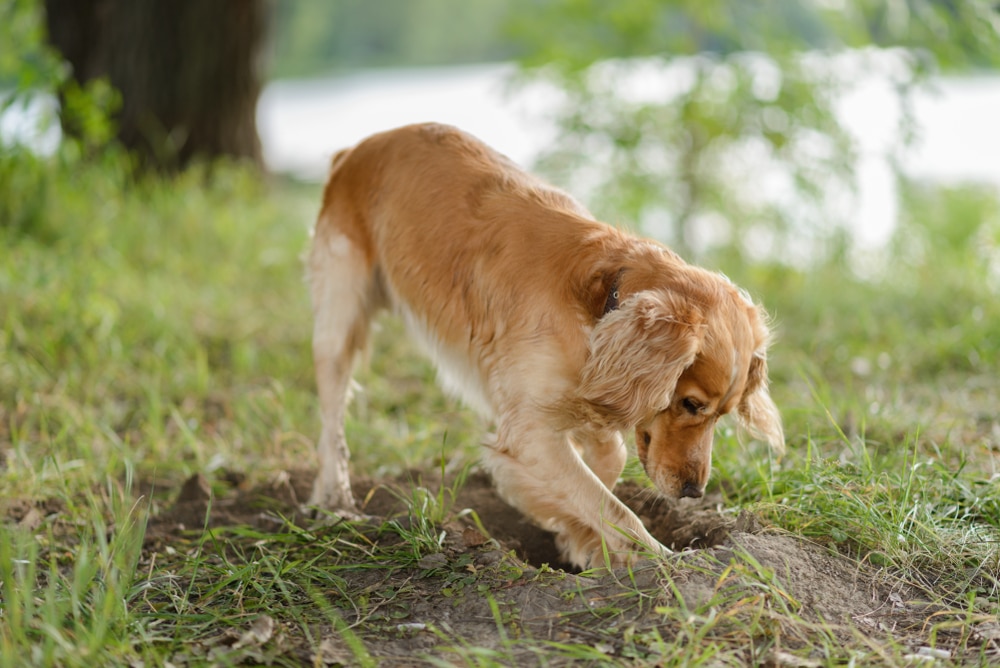Digging behavior is quite common in dogs. Some owners may find it cute too. However, excessive digging of holes can become a nuisance if the cause is not identified. So, it can help to know just why it is dogs dig.
Dogs dig for a variety of reasons. Some degree of digging is instinctual, which is traced back to the dog’s evolution from wolves. In addition, other reasons may include boredom, stress, separation anxiety, high prey drive, hiding objects, and, lastly, searching for a cool place in hot weather.
Table of Contents
Digging Behavior In Dogs
Digging the soil is an instinctual behavior in dogs that is linked to the dogs’ ancestral relatives, wolves. The reason why dogs dig can be attributed to a dog’s high prey drive, searching for scents underground, and trying to retrieve the prey by digging. Dogs may dig for finding protection, comfort, or shelter as well.
Wolves dig dens for their pups, to reach cool underground spots in warm weather, and to search and hide food.
This trait developed in dogs as they evolved from wolves. The instinctual digging behavior made some dog breeds, like Terriers, capable of being used to hunting game from underground dens and tunnels.
Is Digging A Natural Instinct In Dogs?
Digging is as natural as sniffing and barking. Dogs start to dig when they are in puppyhood. This can be a playful activity for puppies. However, they do it instinctively without having to learn it. However, excessive digging can be due to a number of factors like stress, anxiety or fear, etc.
Causes Of Digging In Dogs?
Dogs dig for a variety of reasons other than natural instincts. In order to correct behavioral issues like excessive digging and destructing of lawns, one must identify the specific reason behind this behavior.
Below are some of the possible reasons that can trigger this behavior in dogs.
Pursuing Prey
Dogs dig when they sniff an underground rodent or prey and attempt to reach it by digging holes in the direction of scent signals. Here the dog’s strong sense of olfaction and high prey drive urges it to dig.
Hiding Food Or Objects
When your dog has had enough of a bone or toy but doesn’t want to take the chance of leaving it where it could be “taken,” it may decide to bury it to keep it secure.
Anxiety And Fear
A dog that is stressed due to anxiety or fear associated with places or people can resort to hiding by digging holes. Separation anxiety can trigger this behavior in puppies as well.
Escape
In some rare instances, a dog may try to escape the barn or an obstacle to explore new locations and find mates in heat.
Shelter From Warm Weather, Rain, Or Cold
Some dogs may dig holes in the ground to reach a source of water or to find cool soil to lay down in summer. This behavior is quite common in cold-loving breeds like Samoyeds. Moreover, rain or extreme cold can induce such behaviors in dogs.
Boredom
Inactivity in dogs can lead to boredom. This is one of the most common factors affecting puppies and dogs alike.
High-energy dogs like Samoyeds and Huskies can develop destructive behaviors of ripping household objects like cushions and digging holes when they feel lonely or bored.
Why Has My Dog Started Digging Excessively?
Dogs that dig excessively can destroy lawns by making holes in multiple places. Not only does this destroy the property, but it is also harmful to your dog. Your dog may get bruises, get stuck, get bitten by bugs, or get exposed to parasites and bacteria. This scenario can be quite frustrating and worrisome.
In order to correct this behavior, an owner must identify the cause, as discussed earlier, then take steps to stop it.
How To Manage Digging Behavior In Dogs?

After identifying the causative factors, a dog owner can make some arrangements to regulate this behavior and try to minimize digging. The following are the steps to discourage digging.
Keeping The Dog Entertained
Place toys and objects like obstacles to keep your dog indulged in some kind of activity. Moreover, provide ample exercise, and spend time with your pet by indulging in activities like fetch.
Also, consider adopting another pet to provide a mate for your dog. This will fix digging associated with boredom and loneliness.
Reduce Stress
Identify and remove any stressors or fear factors that can elicit digging behavior.
Provide Comfort
Provide your dog with an insulated dog house or enclosure that is warm and covered. This will help avoid prompting your dog to dig in cold weather. Similarly, in summer, provide shade and a cool environment. In other words, provide your dog with comfort and protection.
Training
Train your dog by using positive reinforcement with the aid of treats and rewards to obey commands. Slowly, the dog will learn what behavior is being rewarded and what behavior isn’t.
Fixing Prey Issues
If your dog is always pursuing prey in a particular area of your yard, humanely trace and fence them out or make your yard unattractive for prey like rodents, etc. Don’t use rodenticides, as it is likely to cause toxicity in dogs.
Provide A Digging Zone
If your dog is a habitual digger, try designating a digging zone, a safe zone of soil that is on the side, and train your dog to dig only at that place with rewards.
Make that area attractive by putting chewable toys and bones there too. Whenever your dog digs in places other than the designated place, negate this behavior by refusing treats and uttering a “No” command.
Work With A Behavioral Specialist
If nothing else is working, try contacting a behavioral specialist. They will be able to give you some tips to help you figure this out.
Preventing Escape Can Prevent Digging
Dogs that are close to fenced areas may try to escape by digging under the fence. So, follow these steps to prevent escape.
- At the fence’s base, bury the chicken wire. Roll any jagged edges away from your yard.
- Place big rocks around the bottom of the fence line, partially buried.
- To make it uncomfortable for your dog to approach the fence, install chain link fencing on the ground (anchored to the bottom of the fence).
- Work on behavioral modification and discourage the behavior of escaping.
Conclusion: Why Do Dogs Dig?
Digging is a natural instinctive behavior in dogs, much like sniffing and barking, and it is linked to a dog’s prey drive and evolutionary traits. However, excessive digging can be a behavioral problem and can have multiple causes, like hiding food, insecurity, stress, finding comfort, and escaping. One should identify the cause before making any effort to fix this problem.
So, are you having a digging problem with your dog? Or are you just curious about why dogs dig? Let us know what’s going on in the comments below!
